
Basque is a language spoken by Basques and other residents of the Basque Country, a region that straddles the westernmost Pyrenees in adjacent parts of northern Spain and southwestern France. Basque is classified as a language isolate and the only language isolate in Europe. The Basques are indigenous to and primarily inhabit the Basque Country. The Basque language is spoken by 806,000 Basques in all territories. Of these, 93.7% (756,000) are in the Spanish area of the Basque Country and the remaining 6.3% (50,000) are in the French portion.

The Basques are a Southwestern European ethnic group, characterised by the Basque language, a common culture and shared genetic ancestry to the ancient Vascones and Aquitanians. Basques are indigenous to, and primarily inhabit, an area traditionally known as the Basque Country —a region that is located around the western end of the Pyrenees on the coast of the Bay of Biscay and straddles parts of north-central Spain and south-western France.
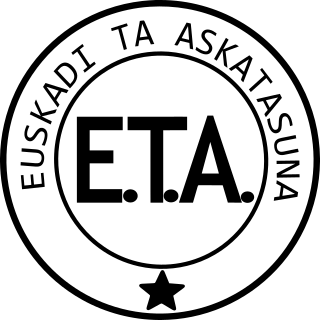
ETA, an acronym for Euskadi Ta Askatasuna, was an armed Basque nationalist and far-left separatist organization in the Basque Country between 1959 and 2018, with its goal being independence for the region. The group was founded in 1959 during the era of Francoist Spain, and later evolved from a pacifist group promoting traditional Basque culture to a violent paramilitary group. It engaged in a campaign of bombings, assassinations, and kidnappings throughout Spain and especially the Southern Basque Country against the regime, which was highly centralised and hostile to the expression of non-Castilian minority identities. ETA was the main group within the Basque National Liberation Movement and was the most important Basque participant in the Basque conflict.
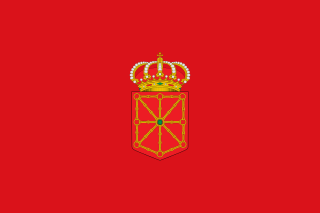
Navarre, officially the Chartered Community of Navarre, is a landlocked foral autonomous community and province in northern Spain, bordering the Basque Autonomous Community, La Rioja, and Aragon in Spain and New Aquitaine in France. The capital city is Pamplona. The present-day province makes up the majority of the territory of the medieval Kingdom of Navarre, a long-standing Pyrenean kingdom that occupied lands on both sides of the western Pyrenees, with its northernmost part, Lower Navarre, located in the southwest corner of France.
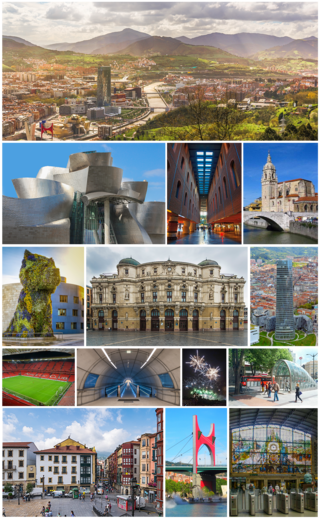
Bilbao is a city in northern Spain, the largest city in the province of Biscay and in the Basque Country as a whole. It is also the largest city proper in northern Spain. Bilbao is the tenth largest city in Spain, with a population of more than 347,000 as of 2023. The Bilbao metropolitan area has 1,037,847 inhabitants, making it the most populous metropolitan area in northern Spain; with a population of 875,552, the comarca of Greater Bilbao is the fifth-largest urban area in Spain. Bilbao is also the main urban area in what is defined as the Greater Basque region.
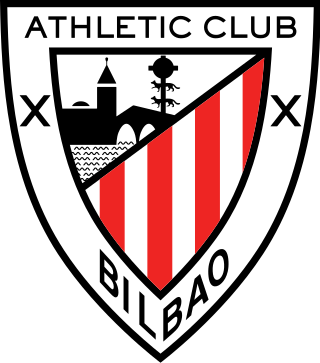
Athletic Club, commonly known abroad as Athletic Bilbao, or simply as Athletic domestically, is a professional football club based in the city of Bilbao in the Basque Country, Spain. They are known as Los Leones because their stadium was built near a church called San Mamés, which was named after Saint Mammes, an early Christian thrown to the lions by the Romans. Mammes pacified the lions and was later made a saint. The team plays its home matches at the San Mamés Stadium. Its home colours are red and white-striped shirts with black shorts.

The Basque Nationalist Party, officially Basque National Party in English, is a Basque nationalist and regionalist political party. The party is located in the centre of the political spectrum.

The Basque Country is the name given to the home of the Basque people. The Basque Country is located in the western Pyrenees, straddling the border between France and Spain on the coast of the Bay of Biscay.

Gipuzkoa is a province of Spain and a historical territory of the autonomous community of the Basque Country. Its capital city is Donostia-San Sebastián. Gipuzkoa shares borders with the French department of Pyrénées-Atlantiques at the northeast, with the province and autonomous community of Navarre at east, Biscay at west, Álava at southwest and the Bay of Biscay to its north. It is located at the easternmost extreme of the Cantabric Sea, in the Bay of Biscay. It has 66 kilometres of coast land.

Balmaseda is a town and municipality located in the province of Biscay, in the Basque Country. Balmaseda is the capital city of the comarca of Enkarterri, in western Biscay and serves an important role in the province thanks to its proximity to the capital city of Bilbao and the regions of Cantabria and Castile and León.
The Basque Country national football team represents the Basque Country in football. It selects players from the Basque Country autonomous community, Navarre and the French Basque Country and is organised by the Basque Football Federation. It is not affiliated with FIFA or UEFA and therefore only allowed to play friendly matches against FIFA or non-FIFA affiliated teams.

The council of Güeñes is a municipality in the county of Encartaciones. It is furrowed by the waters of the river Cadagua and forms with its neighbor, the municipality of Zalla, Salcedo Valley. In the North it borders Galdames and k; in the east Alonsotegi ;in the west the municipality of Zalla and in the south the municipality of Gordejuela. Its more important centres of population are Güeñes, Sodupe, The Quadra, Zaramillo, Sanchosolo and San Pedro de Goicouría.

Artziniega is a town and municipality in the province of Álava, in the Basque Country, northern Spain. Located in the northwest of Araba, on the border with Burgos, Castile and León and Biscay, it was at the junction between the old Kingdom of Castile and the ports of the Bay of Biscay.
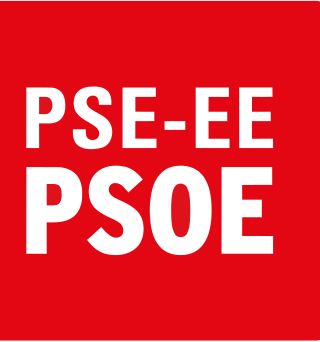
The Socialist Party of the Basque Country–Basque Country Left is a social-democratic political party in the Basque Country that acts as the regional affiliate of the Spanish Socialist Workers' Party (PSOE).

Alberto de Palacio y Elissague (1856–1939) was a Spanish engineer and architect born in Sare and grown up in Gordexola.

The Basque Autonomous Community [ A.C.], also officially called Euskadi [], is an autonomous community in northern Spain. It includes the Basque provinces of Araba, Bizkaia, and Gipuzkoa. It also surrounds an enclave called Treviño.
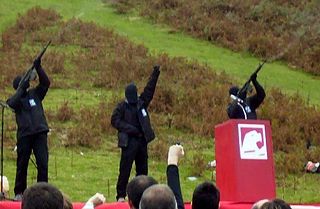
The Basque conflict, also known as the Spain–ETA conflict, was an armed and political conflict from 1959 to 2011 between Spain and the Basque National Liberation Movement, a group of social and political Basque organizations which sought independence from Spain and France. The movement was built around the separatist organization ETA, which had launched a campaign of attacks against Spanish administrations since 1959. ETA had been proscribed as a terrorist organization by the Spanish, British, French and American authorities at different moments. The conflict took place mostly on Spanish soil, although to a smaller degree it was also present in France, which was primarily used as a safe haven by ETA members. It was the longest running violent conflict in modern Western Europe. It has been sometimes referred to as "Europe's longest war".

The Basque Football Federation is the body responsible for managing association football in the Basque Country autonomous region. Its offices are in Bilbao.

Laugar Brewery is a Spanish brewery founded in 2011 in Barakaldo by Eneko Neira, Txus Cabrera, Sergio Valiente and Aingeru del Campo. Their name means four beers in Basque, in reference to its four founders. Eneko had started working in Bleder brewery in Barcelona in 2008, and then convinced the rest of the crew to start homebrewing. After that, they were soon joined by Eder García, who was Eneko's classmate and also had a vast experience in homebrewing.
Gorka Pérez Garay is a Spanish professional footballer who plays as either a central defender or a defensive midfielder for Gimnàstic de Tarragona.





















